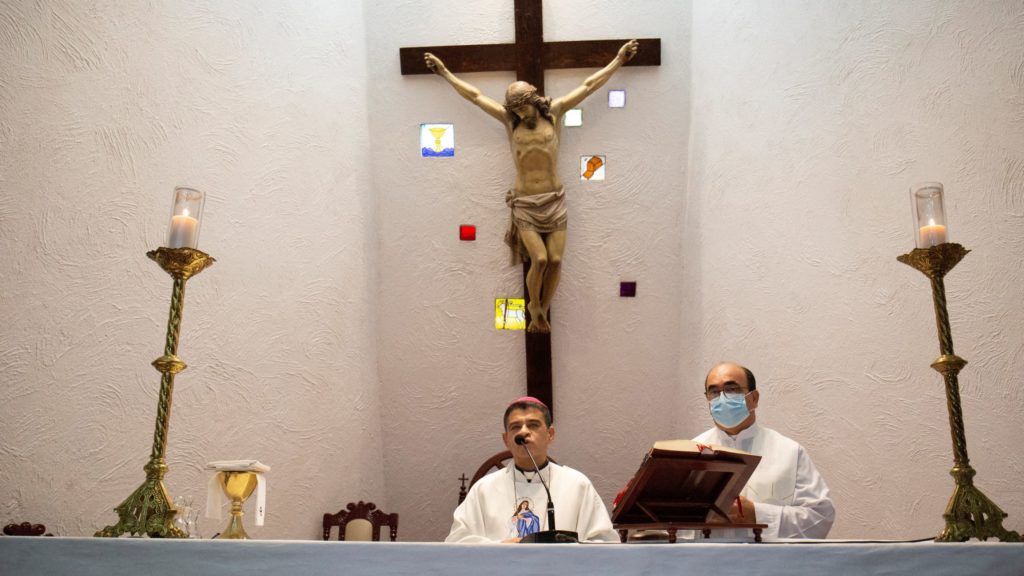Pope Francis made his most direct appeal yet for the embattled church in Nicaragua Sunday, asking national leaders to embrace justice, truth and dialogue after a prominent bishop was sentenced to 26 years in prison.
Speaking to pilgrims present in St. Peter’s Square for his Feb. 12 Angelus address, the pope said, “The news arriving from Nicaragua has saddened me a lot.”
“Here I cannot but recall with concern the Bishop of Matagalpa, Rolando Álvarez, whom I love so much, condemned to 26 years in prison, and also the people who were deported to the United States,” he said, asking faithful to join him in praying for these “and for all those who are suffering in that dear nation.”
The reference was to 222 political prisoners deported to the US on Thursday by Nicaragua, including three Catholic priests, a deacon, two seminarians and a lay photographer.
“We must also ask the Lord, through the intercession of the Immaculate Virgin Mary, to open the hearts of political leaders and of all citizens to the sincere search for peace, which is born of truth, of justice, of freedom, of love, and is achieved together through the patient exercise of dialogue,” the pontiff said.
Pope Francis then led faithful in praying a Hail Mary for the people and leaders of Nicaragua.
His remarks came just days after Álvarez, who’s been under house arrest since August, was sentenced by a Nicaraguan court to over two decades behind bars.
Last week Álvarez was transferred to the National Penitentiary System and was apparently supposed to be among the more than 200 political prisoners deported to the United States at the order of Nicaraguan President Daniel Ortega.
However, Álvarez reportedly refused to leave the country and on Friday was sentenced by a Nicaraguan court to 26 years in prison. The sentence came just days before his trial, originally scheduled for March but which was inexplicably expedited, was set to begin.
Álvarez was accused of treason, undermining national authority, and disseminating fake news, among other things.
During Friday’s hearing, the court also announced that Álvarez would be fined and that he would be stripped of his Nicaraguan citizenship.
He is just one of a slew of church representatives and personnel in Nicaragua to face harassment and persecution in recent years from the regime of Ortega and Rosario Murillo, Ortega’s wife and the country’s current vice president.
Ortega has been in power since 2007, having had most of his rivals for the presidency jailed. Many of his would-be challengers were among the over 200 prisoners deported to the US last week.
Tensions between Ortega and the church have been heightened since 2018, when Ortega accused church leaders of attempting to overthrow him when some acted as mediators with protesters after protests that erupted that year left 300 people dead.
Things escalated last year when the government expelled the Vatican’s ambassador to Nicaragua, Archbishop Waldemar Stanislaw Sommertag, as well as 18 members of the Missionaries of Charity, the order founded by Mother Teresa.
In addition to Álvarez, seven priests and two diocesan collaborators from Matagalpa have also been detained, and the government has led a tight crackdown on Catholic media, closing several radio stations and television channels, as well as prohibiting processions and pilgrimages in the country.
Last month, the Nicaraguan government detained the entire team of people present with Álvarez at the time of his arrest, including four priests, two seminarians, and a cameraman, on charges of treason and spreading fake news.
Earlier this month, a group of civil lawyers representing five of the priests facing charges in Nicaragua announced that the clergymen had each been sentenced to 10 years in prison on charges of conspiracy against the government, however, each of the men were on board the plane carrying the 200 detainees to Washington.
Pope Francis’s remarks Sunday marked the first time he has spoken out publicly on Álvarez’s behalf since the bishop’s arrest last August.

